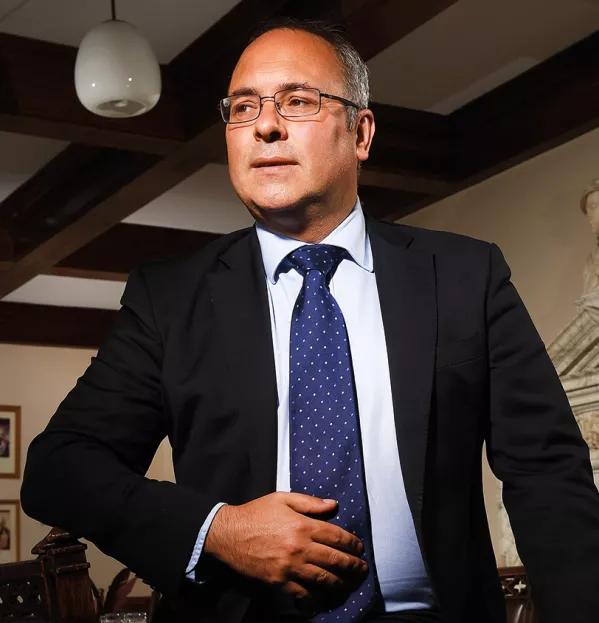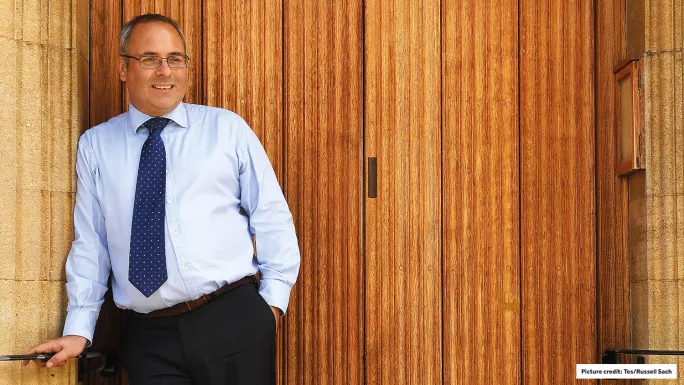Bringing great expectations to a foundation with a ‘Dickensian’ feel

Heath Monk is entering the brave new world of multi-academy trust (MAT) leadership, but part of him still misses teaching Chaucer to a class of 15- and 16-year-olds.
“I do miss the interaction with children,” says the executive director of King Edward VI Foundation - a well-known group of grammar schools and independent schools in Birmingham. “I always loved teaching GCSE English literature - which was mad as it was huge amounts of coursework and marking.”
But it wasn’t the workload that drove him out of the profession and into the Department for Education; it was, in fact, his colleagues.
“I got to a point where I got a bit sick of teachers actually,” he admits.
“I love teaching but I think teachers can sometimes be maybe not as appreciative of how good their job is. They are quite moany places, staffrooms. And also quite political - with a small p - and cynical.”
Ironically, once Monk had left teaching to become a civil servant he found himself around the table with the teacher unions creating a national agreement on workforce reform.
“It was painful at times. But that was something I look back on and think, ‘we actually turned back the tide on teacher workload for a while’,” he says.
Standing in his office - which has a framed painting of King Edward VI next to a coat of arms on the wall - Monk says they are planning to do some work to the building. It is no longer just the headquarters for the 450-year-old foundation; it is also the base for Monk’s new MAT. “I think a modern MAT needs to be a bit more open plan,” he says. “[The building as it is now] is a bit of a ‘time capsule’. It has a Dickensian feel.”
Changing cultures
When Monk started at the foundation a year ago, one of his main priorities was forming a MAT to run alongside the historic establishment in Birmingham. And his wish came true in March.
The group of schools currently only has one sponsored academy, but Monk is keen to recruit more schools that are non-selective. He wants to “bring the curriculum and the high expectations” of selective schools to other comprehensives - like they have tried to do with Sheldon Heath Academy.

The privately educated executive director has seen first-hand how the culture in selective and non-selective schools can differ. Monk started his teaching career at a comprehensive in Tunbridge Wells before moving to a prestigious nearby independent school.
“Teaching is teaching. I wouldn’t say that was radically different,” he says. “But it is that sense of what is possible with the children. The main difference was that kind of atmosphere of expectation.”
Ensuring that arts and sport sit alongside an academic core in comprehensive schools - in the same way they do in independent schools - is vital for Monk. It is something that drove some of his work in his previous chief executive role at the school leadership charity, the Future Leaders Trust.
If the extra-curricular opportunities at the academically selective Christ’s Hospital boarding school he attended had not been there, Monk says he doubts he would have secured such good results. It taught him other social skills, he explains.
“I did English because my football coach was my English teacher,” he says. “That’s why I went to university to read English.”
Christ’s Hospital - an independent school where most pupils pay no more than 10 per cent of fees - was set up by Edward VI 450 years ago, just like Monk’s current workplace.
“So it’s strange that I’m here,” he says.
The foundation has found itself under the spotlight since Monk took the helm, thanks to the fact that Theresa’s May’s now infamous former joint chief of staff, Nick Timothy, was an old boy from King Edward VI Aston, a boys’ grammar school in the foundation.
‘The future is going to be different’
The Green Paper plans on expanding selection are now up in the air following last week’s general election. But, speaking before the results were known, Monk says that, whatever the policy outcome, the foundation’s schools won’t be left out in the cold. “Effectively, since 1997, there has been a kind of truce on grammar schools,” he says. “The Labour Party has said, ‘We are going to stop trying to close the 163 that are left,’ and the Conservatives have said, ‘We are not going to open any new ones.’
“I think the Green Paper marked an end to that sort of détente where grammar schools were kind of left to one side and forgotten. So the future is going to be different, whatever happens with the Green Paper.”
Monk says he is “massively” worried about the looming funding cuts - especially in his smaller schools. “The struggle that we have now is keeping the breadth of the curriculum where it needs to be,” he says, speaking before this week’s pledge from DfE sources to take a “fresh look” at school funding.
“If you lose [things that engage children and build character], you lose something incredibly valuable from the system.”
Even though the Conservative manifesto pledged to increase school funding by £4 billion by 2022, that still amounts to a 7 per cent real-terms cut compared with 2015-16, according to the Institute for Fiscal Studies.
Monk was expecting the spotlight to remain on the work that existing grammars do to ensure they are not dominated by affluent families, whatever the election outcome.
The King Edward VI schools were one of the first of the selective schools to prioritise children eligible for pupil-premium funding in their admissions policies once the code was changed in 2014. Monk would like to increase the proportion further to greater reflect the city’s population.
“I would hope for at least 30 per cent,” he says. “The city is 45 per cent to 50 per cent pupil premium.”
It is too early to say whether the quota policy will affect the schools’ results - but so far there has been no evidence to suggest that these children are less able or suited than peers with higher scores.
You need a Tes subscription to read this article
Subscribe now to read this article and get other subscriber-only content:
- Unlimited access to all Tes magazine content
- Exclusive subscriber-only stories
- Award-winning email newsletters
Already a subscriber? Log in
You need a subscription to read this article
Subscribe now to read this article and get other subscriber-only content, including:
- Unlimited access to all Tes magazine content
- Exclusive subscriber-only stories
- Award-winning email newsletters